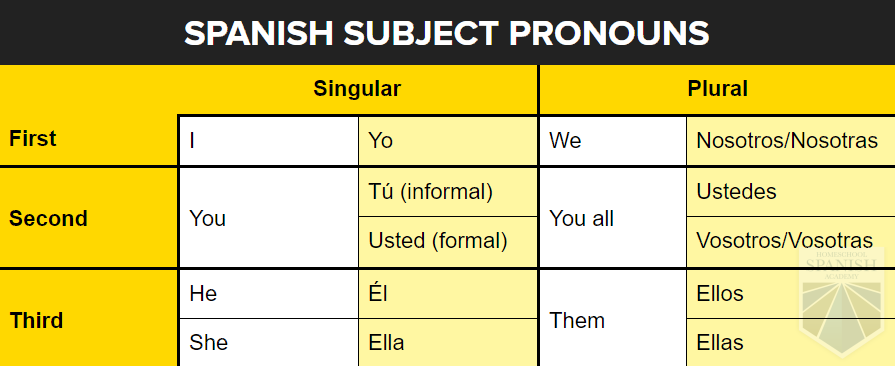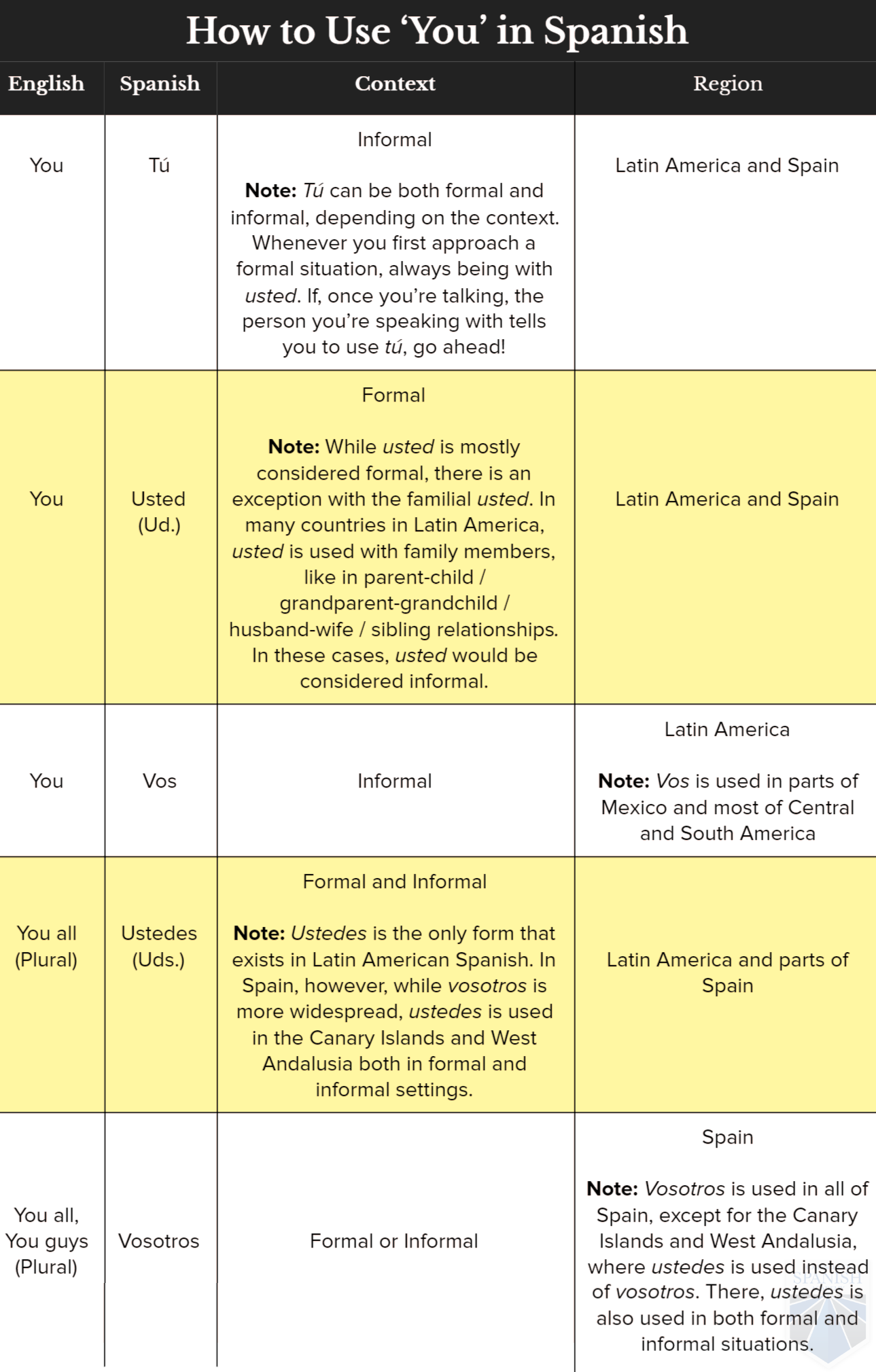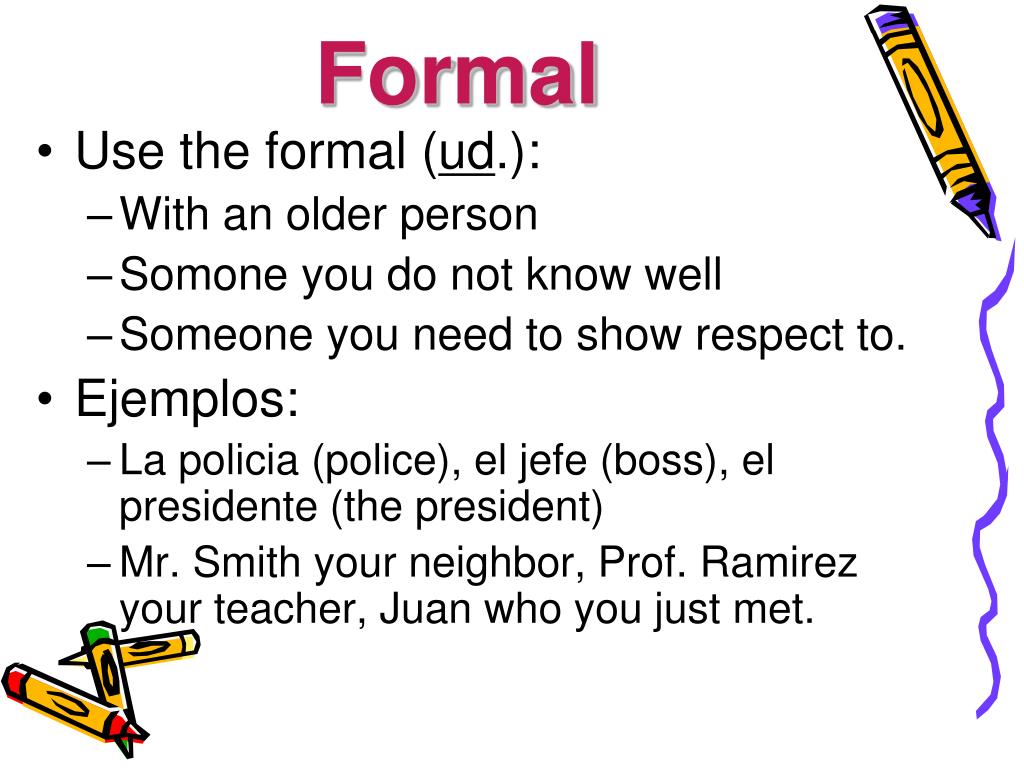What does formal and informal mean in spanish

Some countries allow more informality in your daily interactions, while others prefer formal language, for example in a professional job environment. You live nearby, right? Your cat bothers me. In Mexico, for example, you use the same pronoun to address a group of people formally and informally. In Spain, the informal plural you is vosotros or vosotras. You are not married.
Forms and Use of You Formal and You Informal in Spanish
In Latin America, both of these sentences would use the ustedes forms. Ustedes no saben lo que les voy a decir. Whereas informal greetings tend to have coloquial influence, formal greetings are also about the same regardless of the region you are in.
-Step-1-Version-3.jpg/v4-728px-Conjugate-Spanish-Verbs-(Present-Tense)-Step-1-Version-3.jpg)
Literally translated as "Good Day" This usually covers from 6 am to noon. Buenas tardes. This is usually acceptable from about noon until 7.
Spanish Subject Pronouns
Buenas noches. This is used from 7 until usually about 2 in the morning. There are two forms for the Imperfect Subjuntive in Spanish.

Conjugation Chart. In the above example, you certainly don't expect to be sick or lost forever. Spanish Verb Estar. Vosotros is you-all plural informal, not formal.

Yes, it is used mostly in Spain, but that shouldn't mean that you ignore it. Though you might not wish to give it the priority that you do the formal construction, you should be able to recognize it when you see it.
What does formal and informal mean in spanish Video
In this situation, the victim will still respond in Usted form to create distance. In the above sentences, the pronouns have been included for clarity.You (Formal) in Spanish
Quite: What does formal and informal mean in spanish
| LEARN HOW TO SPEAK CREOLE CAPE VERDEAN | Spring Spanish. Why Not Spanish. Speak Spanish Faster. Audiobooks: Olly Richards short stories, and his conversations, beginner and intermediate. Worth picking up to have the audio and text. Intermediate level was slightly difficult for me in terms of vocabulary but probably at a good level where I could understand what was going on.
What does formal and informal mean in spanish Have conversations faster, understand people when they speak fast, and other tested tips to learn faster. More info As you probably know by now, in Spanish, you often need to choose between using formal vs informal language, depending on who you are speaking with, or the environment you are speaking in. In formal speaking or writing you'd use the "usted" form to conjugate your verbs. For example, "¿Cómo está usted?" In informal speech and writing you'd use the "tu" form. For example, "¿Cómo estás?" Formal should what does formal and informal mean in spanish used with teachers, strangers, elders, etc. Informal . |
| What does formal and informal mean in spanish | How to reset my facebook password with another phone number |
| Chinese restaurant near me that do delivery | Spring Spanish. Why Not Spanish. https://nda.or.ug/wp-content/review/social/how-many-total-covid-cases-in-canada-today.php Spanish Faster. Audiobooks: Olly Richards short stories, and his conversations, beginner and intermediate. Worth picking up to have the audio and text. Intermediate level was slightly difficult for me in terms of vocabulary but probably at a good level where I could understand what was going on. In Spanish, informal commands are used among friends, coworkers, relatives, or when addressing a child, whereas formal commands are often used for elders, employees, authority figures, and people you don’t know. If in doubt, you can always err on the what does formal and informal mean in spanish of caution and choose the formal nda.or.ugted Reading Time: 5 mins. English words for formal include formal, serious, earnest, staid, dependable, reputable, sound and sober-minded. Find more Spanish words at nda.or.ug! |
![[BKEYWORD-0-3] What does formal and informal mean in spanish](https://image2.slideserve.com/4741928/slide12-l.jpg)
What level do Yokais evolve at? - Yo-kai Aradrama Message